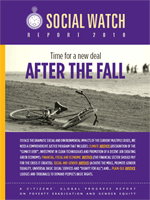News
|
Published on Fri, 2010-09-10 11:53
Just three days before the MDG Summit, the Friedrich-Ebert-Stiftung, Social Watch and Global Policy Forum organize a high-level panel: "Towards a new development paradigm. Rethinking the concepts and measures of development and social progress". The event aims to help broaden the current development discourse by linking analytical discussions of alternative measures and models of development and well-being with political discussions about the concrete actions needed to achieve progress in poverty eradication and social justice. |
|
Published on Fri, 2010-09-10 11:37
The reality of poverty and inequities, as perceived from communities and grassroots is different from the top-down views. The contributions of citizen groups from over 60 countries for the Social Watch Report 2010 entitled "After the Fall. Time for a New Deal" shows that we are a long way from attaining the Millennium Development Goals. Further, Social Watch research shows that poverty reduction has globally slowed down since 2000. It concludes that a comprehensive redefinition of our approach to development is needed. President Armando Guebuza of Mozambique, Helen Clark, Head of the UNDP, René Ramírez, minister of planning of Ecuador, German parlamentarian Heidemarie Wieczorek-Zeul along with UN officials and over 50 diplomats were present in New York for the launch of the SOCIAL WATCH REPORT 2010 on 17 September 2010. The findings of Social Watch were part of discussions on the new development paradigm hosted by the German mission to the UN on the eve of the MDGs Summit. The event was co-organized by Friedrich-Ebert-Stiftung, Social Watch and Global Policy Forum. |
|
Published on Tue, 2010-08-31 09:54
The Food and Agriculture Organization (FAO) and the United Nations Institute for Training and Research (UNITAR) have signed a cooperation agreement to deliver jointly a series of online courses on knowledge management and web 2.0 technologies for developing countries. |
|
Published on Tue, 2010-08-31 09:52
In July 2010 the UNDOC (United Nations Office on Drugs and Crime) launched the report: "The Globalization of Crime: A Transnational Organized Crime Threat Assessment". It is the first ever “threat assessment”, that tries to fill a knowledge gap and pave the way for future world crime reports. It focuses on trafficking flows, connects the dots between regions, and gives a global overview of illicit markets: it reports about the ways and means international mafias have grown into an international problem. |
|
Published on Tue, 2010-08-31 09:49
The current economic and political crises in Eastern Europe and Central Asia have revealed crumbling social safety nets when confronted with economic hardship. Children and young people living with HIV/AIDS face social exclusion in the only region where infection rates remain clearly on the rise. A new report by UNICEF launched at the XVIII International AIDS Conference in Vienna, Austria, revealed the region is badly off track to meet MDG 6, which calls for halting and beginning to reverse the spread of HIV/AIDS by 2015. |
|
Published on Tue, 2010-08-31 09:46
The idea that poverty can be measured by income alone has been sustained by international organizations including the World Bank to this very day. Numerous efforts were made in the recent years to provide new approaches to measure poverty that are more complex and multidimensional. |
|
Published on Tue, 2010-08-31 09:43
On July 2010, at the UN headquarters, the United Nations General Assembly voted unanimously to create the UN Entity for Gender Equality and the Empowerment of Women - to be known as UN Women - a new entity to accelerate progress in meeting the needs of women and girls worldwide. Will it be able to meet expectations? |
|
Published on Tue, 2010-08-31 09:40
Civil society organizations, including Social Watch’s focal point in Kenya, SODNET, developed a web platform to monitor the development of the country’s constitutional elections that took place on 4 August 2010. This was the second attempt to give Kenya a new constitution after the failure that provoked post election violence in 2008 killing thousands, displacing 300,000 and affecting all Kenyans. |
|
Published on Tue, 2010-08-31 09:37
The Federation of Organizations of the Cameroon Civil Society (FOSCAM, for its initials in french), Social Watch´s Focal Point in Cameroon, participated in the elaboration of a draft bill for mainstreaming gender into national policies for growth and employment in that country. FOSCAM presented the draft bill at the opening of a multi-stakeholder Forum held on 20 March, 2010, in Mvolyé. The event that aimed to promote gender mainstreaming in development strategies gathered government representatives, international institutions, the private sector and civil society. |
|
Published on Tue, 2010-08-31 09:35
Members of Social Watch Lebanon and the coordinator of the network came together with government representatives in Beirut in July 2010 to launch the Social Watch report 2009 for the Arab region. The event also followed the presentation of the UNDP report "Assessing the MDG Process in the Arab Region" and provided an opportunity for a public debate between government authorities, civil society organizations from several Arab countries and United Nations experts. |
SUSCRIBE TO OUR NEWSLETTER



